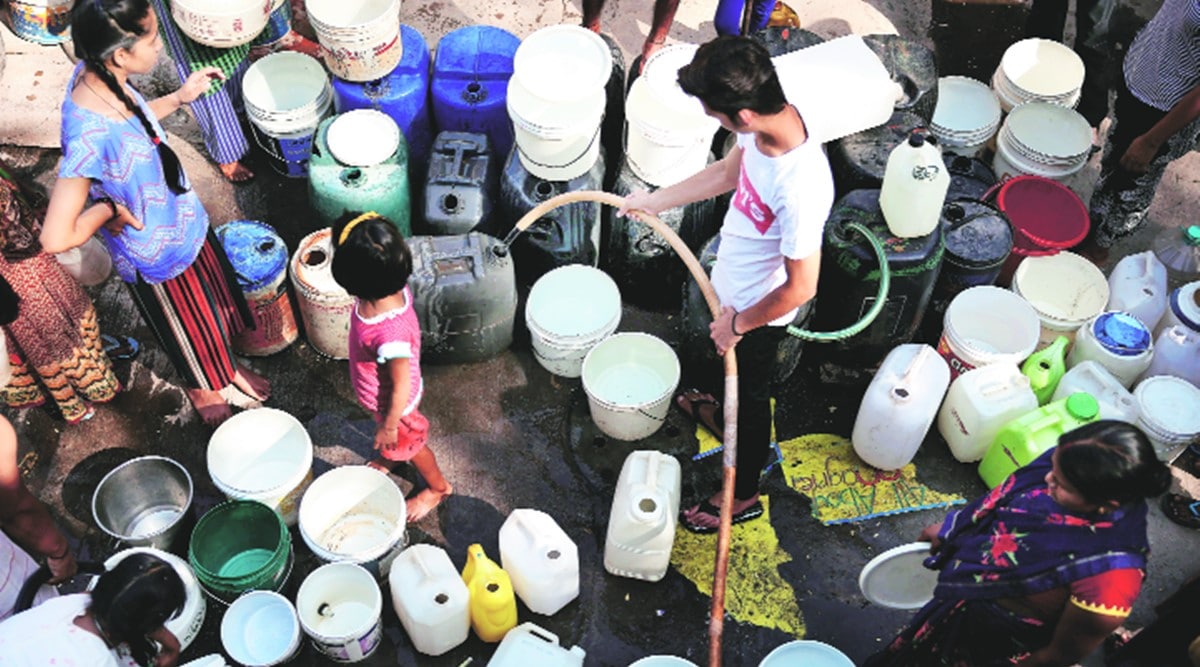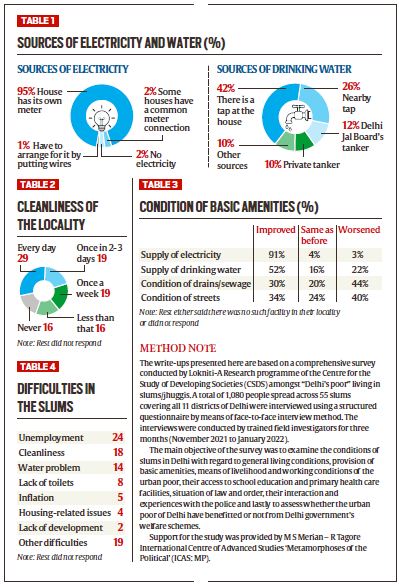 People residing in the capital’s slums reported significant discontent with some facilities, notably drinking water and sanitation. (Express Photo by Praveen Khanna)
People residing in the capital’s slums reported significant discontent with some facilities, notably drinking water and sanitation. (Express Photo by Praveen Khanna) Chief Minister Arvind Kejriwal has often spoken about the ‘Delhi model of governance’ – it was, in fact, one of the reasons which facilitated the party’s historic sweep in the recent Punjab elections. The party aggressively promotes this model, based on welfare delivery, quality healthcare and school education and providing water and electricity at affordable rates. Starting today, a Lokniti-CSDS study on urban slums in Delhi examines whether this model of governance also applies to those residing in slums, and taps into experiences of slum dwellers with respect to quality of basic amenities.
Access to basic amenities
Slum dwellers in the study reported significant discontent with some facilities, notably drinking water and sanitation. A huge majority of 95% households say they have access to electricity meters (Table 1). Two per cent said that they share a common meter and 1% said that they arrange for electricity by putting wires. A mere 2% said that they have no access to electricity.
Water, which too is a basic necessity for survival, falls under the purview of the Delhi Jal Board. A little over four in ten households (42%) have a tap in their homes (Table 1). Over a quarter stated the main source of drinking water is a nearby tap. Twelve per cent said that the main source of water is Delhi Jal Board’s tankers and one in ten stated that they rely on private tankers for drinking water.

With regards to sanitation, three-fifth of the households (57%) reported that they do not have a toilet in their homes. Three-fourth of respondents (76%) said that MCD sweepers clean their locality, 14% stated that they clean their locality on their own, 4% said it’s cleaned by private cleaners and about 5% of the slum dwellers said that their locality is never cleaned. Despite a huge proportion of respondents saying that MCD takes care of cleaning the locality, the actual condition of cleanliness leaves a lot to be desired, with about three in ten (29%) reporting that their locality is cleaned every day. About two fifths (19%) said that cleaning takes place once in two to three days (Table 2). 35% claimed infrequent cleaning of the locality with the areas being cleaned either weekly or even less than that. Sixteen per cent of the slum dwellers stated that their locality is never cleaned.
While the Aam Aadmi Party is in power in the state, the MCDs are ruled by the BJP.
Though only 15% of the households said that they received gas cylinders under the Ujjwala Yojna, a central government scheme, when it comes to cooking gas penetration in the slums, 96% of the households said they have a cooking gas cylinder or connection. The remaining households either use a kerosene stove or wood for cooking.
Assessment of condition of basic amenities
There was a unanimous opinion of slum dwellers on the condition of electricity in the last five years, with 9 of 10 people claiming improvement in the condition of electricity (Table 3). However, the condition of water, sanitation and streets did not enjoy similar popularity. Though a little over half the slum households said that the condition of water has improved, two in ten said that the condition had deteriorated. On the condition of drains and streets, a higher proportion of households said that the condition had deteriorated than improved. The findings are consistent with the fact that many households in the slums in Delhi did not have water taps in their homes and reported irregular cleaning of the locality.
Asked about the overall condition of the locality in the last 5 years, a little over half (52%) stated that the condition has improved, three in ten (32%) said there was no change and it was the same as before, and 16% reported worsening of the overall condition of the locality.
Key problems
When slum dwellers were asked to state their biggest difficulty, the issue of basic amenities, especially with regards to cleanliness (18%), water problem (14%) and toilets (8%), were the top four problems, with unemployment being the top most problem which was reported by a quarter of respondents. Four per cent spoke of housing-related issues.
The data further shows that slum dwellers look up to the Aam Aadmi Party more than any other party, with close to three-fourth (56%) stating AAP to be the party which is best to work on issues related to people in the slums. BJP and Congress were way behind (16% and 10% respectively).
The overall picture with regards to basic amenities show that though there is significant satisfaction with provision of electricity, a large chunk does not have access to clean drinking water, sanitation and cleanliness, forcing them to live in substandard conditions.
Kumar is co-director of the Lokniti programme at CSDS
- The Indian Express website has been rated GREEN for its credibility and trustworthiness by Newsguard, a global service that rates news sources for their journalistic standards.

